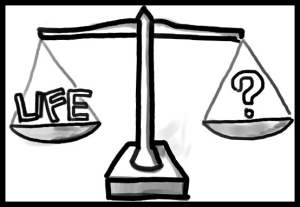“Price of Life” by Linda Cai
This article is not one of those grossly scientific assessments of how many cents the chemicals inherent in a human body are worth — that arcane knowledge that scientists used to be fond of bragging, accidentally showing how much they didn’t know about the value of a human being. Nor is it that equally sociopathic assessment beloved of life insurance assessors that sizes a person’s ultimate worth up in dollars and cents by age and theoretical future earning potential had they lived. But I fear high-earning basketball players, for example, who might be a drain on society in every way as individuals, are valued much more by society today than, say, a poor parent who devotes his or her life to kids and other deserving.
Every now and again you catch something in the news (or on the tv crime shows) that just doesn’t sit right, in fact seems very, very wrong. So wrong that you wonder if you haven’t missed something in your upbringing, some essential moral or cultural message you failed to read between the lines. A message apparently so central to the human condition that you wonder if you’re not irretrievably divorced from the rest of humankind. One of these is the fact of how very much value the Judeo-Christian ethic places on the physical remains of deceased persons.
In christian metaphysics people are taught that the human spirit — all that which is of value in a person — flees the body at the point of death. All that is left is the worthless husk, the vessel in which a person’s being was carried. So what great lengths people will go to recover a body that is lost has always been a total mystery to me. The concept of “closure” seems inadequate to explain why a believer in afterlife should need physical remains to grieve over. Yet, serial murderers have been set virtually scot-free just for telling the locations of their victims — risking the possibility that they might destroy more actual lives. The value of a cadaver — a gruesome abomination of a remnant that carries no hint of the worth of the person when he or she was alive — to grieve over, if even that much is left of the beloved’s corporeal remains, is set higher than viable lives.
Strangely, the third apex of the original European-Arabic-Jewish religious-cultural triangle, Islam, holds comparatively very little sacred value in human remains. Indignities and atrocities are meted out by Muslim tribesmen to the remains (and live bodies) of enemies that even brutal modern Westerners might wince at. The imbalance in values has never been shown better than when, first, a few years ago, the dead bodies of two Israeli soldiers were traded by Palestinians back to the state of Israel in return for setting 300 to 400 prisoners free. Last year (2011) when 1,000 Palestinian prisoners were set free in exchange for one live Israeli soldier, this highlighted a large disparity in the value different cultures set on life. You have to wonder at the sanity of a government of an independent state — Palestine — that would place so little value on its live citizens, officially in the ratio of one thousand to one Israeli, for the whole world to see its priorities.
Admittedly in Western culture cremation is increasingly recognised as an option in which there is no mourning place where remains of the loved one “rest in peace”. This is becoming a logistical necessity where dead people in often lavishly decorated graves meant as permanent monuments are taking up vast tracts of lebensraum which could be used by the living or preferably left to revert to nature; seven billion specimens of humankind currently overpopulating the planet seems like more than plenty.
At the same time in the West, I think mere existence of our bodies in a breathing, pulsing state tends to be vastly overrated. We all die, but except in the case of people who can’t afford health care every possible resource is brought to bear in prolonging what is often a torturous clinging to vital signs that show that life still lingers, technically. Trendy people spend cumulative years of their lives ensuring that they have every chance of existing what statistically might be just a fraction of a year extra, and not even guaranteed that. Given the fragility of existence, a previously undetected condition or a thoughtless moment crossing the street or at the wheel is likely to cancel out all well laid plans for the future. Such absurdities, sometimes bordering on obscenity, as preserving as a right the existences of confessed, proven-beyond-any-doubt serial murderers, convolutes morality to the point of turning it on its head. The attention span of many humans being what it is, the mass murderer is fast switched to the poor downtrodden underdog in prison, and is wept over and proposed to by seriously irrational women awash in protective hormones. And, just as likely, convinced in their girl power to change him; at least, dress him better.
In cases where rehabilitation/born-again appeal doesn’t work the value of a human body (deceased) tends to rise beyond all reasonable expectations of inflation. As a symbol of martyrdom to the cause against unfeeling officialdom it is carried like that of a saint from one generation to the next of Dead Man Walking fans.

